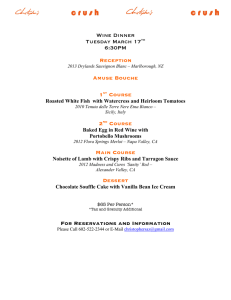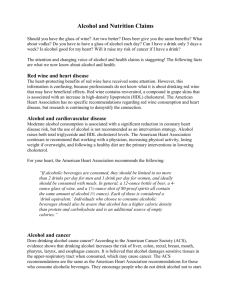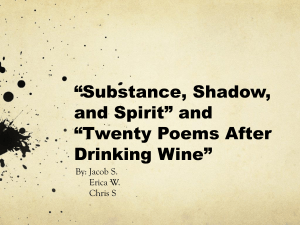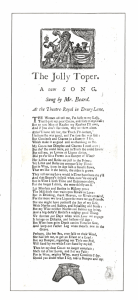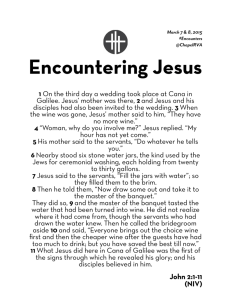Abstinence of Alcohol - CrownRidge Ministries
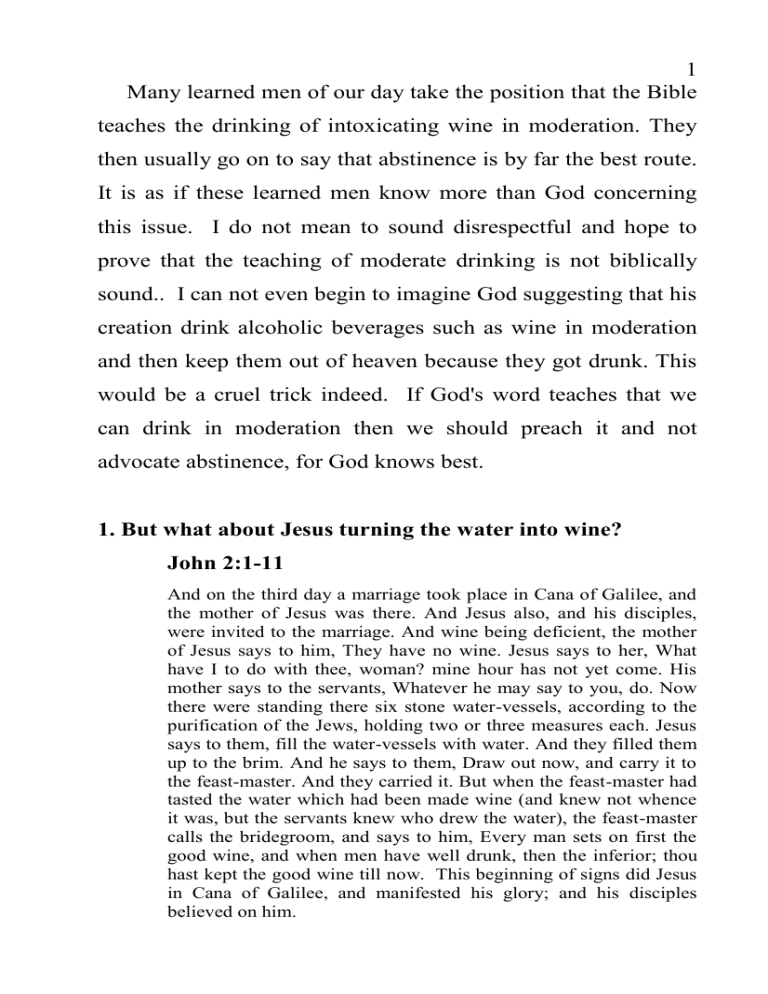
1
Many learned men of our day take the position that the Bible teaches the drinking of intoxicating wine in moderation. They then usually go on to say that abstinence is by far the best route.
It is as if these learned men know more than God concerning this issue. I do not mean to sound disrespectful and hope to prove that the teaching of moderate drinking is not biblically sound.. I can not even begin to imagine God suggesting that his creation drink alcoholic beverages such as wine in moderation and then keep them out of heaven because they got drunk. This would be a cruel trick indeed. If God's word teaches that we can drink in moderation then we should preach it and not advocate abstinence, for God knows best.
1. But what about Jesus turning the water into wine?
John 2:1-11
And on the third day a marriage took place in Cana of Galilee, and the mother of Jesus was there. And Jesus also, and his disciples, were invited to the marriage. And wine being deficient, the mother of Jesus says to him, They have no wine. Jesus says to her, What have I to do with thee, woman? mine hour has not yet come. His mother says to the servants, Whatever he may say to you, do. Now there were standing there six stone water-vessels, according to the purification of the Jews, holding two or three measures each. Jesus says to them, fill the water-vessels with water. And they filled them up to the brim. And he says to them, Draw out now, and carry it to the feast-master. And they carried it. But when the feast-master had tasted the water which had been made wine (and knew not whence it was, but the servants knew who drew the water), the feast-master calls the bridegroom, and says to him, Every man sets on first the good wine, and when men have well drunk, then the inferior; thou hast kept the good wine till now. This beginning of signs did Jesus in Cana of Galilee, and manifested his glory; and his disciples believed on him.
2
If Jesus did make the water into wine, then I agree we all should have the right to do so. If Jesus did drink fermented wine then yes, we should also be able to do so also. Our children should be allowed to drink in moderation and the church should be silent concerning "social drinking". Did Jesus turn six water pots each holding approximately thirty gallons of water each into fermented wine for the wedding guests to drink? Did
Mary really bring her son to a three-day party where everyone was drinking? Even in moderation, one would surely be drunk in three days if all the wine ran out. Habakkuk 2:15 says, "Woe to him that giveth his neighbor drink" Solomon says in
Proverbs 20:1 that wine is a mocker, strong drink is raging: and whosoever is deceived thereby is not wise". Jesus did not give his neighbors fermented wine to drink. He was not deceived.
Mary's friends were not having a three day drunken bash.
Some say but Jesus did drink wine on this occasion and others also. That is why he is called a winebibber. Yes, it is true Jesus was called a winebibber, but He was called a devil and glutton also. He was not any of these nor was he a fermented wine drinker. Besides we are admonished in
Proverbs 23 verse twenty not to be among winebibbers, among riotous eaters of flesh for the drunkard and the glutton shall come to poverty; and drowsiness clotheth with rags. According to those who say Jesus was indeed a winebibber then, we should
3 not associate with him and he certainly should not have associated with his friends.
2.
So how do we explain the word of the governor of the
feast who said:
Every man sets on first the good wine, and when men have well drunk, then the inferior; thou hast kept the good wine till now.
The simple point here is that the custom of the day was to set a "cheaper" wine out after everyone was full. If "well drunk" meant these men at the wedding feast were intoxicated then
Mary and Jesus were instrumental in tempting these men and woman, mocking the Old testament prophets and the teaching
Jesus would give concerning the Lords prayer that cries out,
"Lead us not into temptation."
The wine produced was nonalcoholic such as our tea.
Nonalcoholic wine was more desirable than fermented wine. It was called "nectar" or "ambrosia" which was food for the gods.
The wine Jesus produced was the pure fruit of the vine. It was
"ambrosia".
Think about it. The first of the plagues Moses performed in the Old Testament was to turn the water into blood. The first sign Jesus preformed under grace was to turn the water into wine. The period of grace was now available. Jesus had come that all men might have life and have it with zest, or more abundantly. He would not use intoxicating wine as a sign of
4 life abundant. Fermented wine is decayed wine. Would the
Lord use decayed wine as a sign of bringing abundant life and as a sign of new life in the Holy Spirit.
Science proves without a shadow of doubt that alcoholic consumption destroys men and woman. Thousand of birth defects yearly are attributed to alcoholic. Alcohol is known as a teratogen, which literally means "'monster -producing."
According to Dr. Sophie Pierog, Director of Pediatrics at the
Jersey Medical Center, " Alcohol has an effect on the early embryo in terms of the organization of brain cells. A smaller number of neuronal cells are formed, and there is a disorganization of these cells within the brain as the embryo develops under the influence of alcohol." (David Wilkerson,
Sipping saints 1978). Jesus knowing these facts would not produce alcohol and encourage men to drink moderately, knowing that if they drank in excess and became drunk He would condemn them to an eternal hell.
3. What about Psalms 104: 15 and other such scriptures
And wine which gladdeneth the heart of man ; making his face shine with oil; and with bread, he strengtheneth man's heart. 15
KJV
There is a new wine (nonalcoholic) that makes glad the heart of man and there is alcoholic wine that destroys the body. I will give examples under a separate heading.
5
4.
Didn't Paul instruct Timothy to take a little wine for his
stomachs sake, and other frequent infirmities?
(1 Tim 5:23)
Drink no longer only water, but use a little wine on account of thy stomach and thy frequent illnesses.
Some will say that a Deacon must be a man not be given to
"much wine".(1Tim 3:8). However, for a Bishop wine is forbidden. (1 Tim 3:3) Is this true? Was Timothy a Bishop?
Was Paul a Bishop? If yes, then how could Paul tell Timothy to take a little wine for the sake of his stomach and for other frequent illnesses? Lev 10:9 says do not drink wine nor strong drink, thou and thy sons with thee, when thou goes into the tabernacle of the congregation, lest you die. It shall be a statue forever throughout your generations…
Adam Clarke says that among the Greeks and Romans the state of a youth was extended to the age of thirty. No respectable young man drank wine before the age of thirty.
Paul wanting to help Timothy to overcome guilt and tradition
(as he was on the border of adolescence), encouraged Timothy,
(a bishop) to drink (forbidden) wine for his stomachs sake.
Adam Clarke believes no respectable Greek or Roman drank wine before the age of thirty. Adultery was forbidden by God among his people yet twenty three thousand fell in one day (1 Cor 10:8). Paul would never advise another Bishop to drink fermented wine knowing that it could be tempting not to
6 mention the poor example it would be of a Bishop who was to be blameless before all men. If twenty three thousand individuals gave into the temptation of sexual immorality in one day I am sure many more would give into the temptation of drinking more than in moderation.
5.
If 1 Timothy 3:8 did teach moderation in drinking, then what is moderation?
One man has five glasses of wine and another drinks only one. The man who drinks one glass gets silly and the man who drinks five glasses is moderate. Where is the line drawn and exactly where does one cross the line and miss heaven? Paul says in I Cor 5:11 NOT TO EAT WITH A DRUNKARD AND
IN VERSE 13 HE CALLS A DRUNKARD A WICKED
PERSON. When is a person drunk? Are they 10% drunk after two glasses? Are they 1/1000 % drunk with a sip? When are they considered drunk? God would not play with the souls and minds of men concerning such a potentially dangerous thing.
Would Paul advise Timothy to drink and destroy his liver to save his stomach? Fermented wine destroys the liver and perverts judgement. This is a known fact. There is 156 times more nourishment in beef than in the same amount of wine.
There is also more nourishment in one loaf of whole wheat bread than many gallons of beer.
7
Also if drinking past moderation obtained a front row seat in hell and the Apostle Paul and Jesus both advocated drinking…but in moderation…then with the same reasoning we could conclude that adultery and murder in moderation were ok.
After all David was a man after God's own heart and he only plotted to kill one man. He only committed adultery in moderation. After all he waited until her mourning time was past didn't he? That's moderation isn't it? And what about moderation in pride. God said he hated a proud look. If we are proud and high minded in moderation it should be ok This reasoning is unsound. Moderation in drinking is very dangerous indeed.
6. Priests were not to drink (Lev 10:9)
Priests were not to drink wine or alcohol. Isaiah 28:6 reads,
"But they also have erred through wine, and strong drink, they are swallowed up of wine, they are out of the way through strong drink, they err in vision, they stumble in judgement.."
Certainly Jesus, Paul and Timothy did not drink strong drink or fermented wine.
Jesus is our High Priest and so is every believer
Peter said that every believer was a chosen generation, a royal priesthood, an holy nation, a peculiar people; that ye should shew forth the praises of him who hath called you out of darkness into his marvelous light. He goes on to say, "Which in
8 times past were not a people, but are now a people of God:
…..ABSTAIN FROM FLESHLY LUSTS, which war against the soul. (I Peter 2:9)
Rev 1:6 tells us He has made us kings and priests unto God and his Father …Jesus is our high priest, he could not have drank fermented wine nor encouraged others to drink it.
6.
What about Proverbs 31:6 which states we should give wine to those who are dying?
Alcohol is addicting. Alcohol has a power to snare one who drinks it. It is so simple to drink. It is readily available. It is socially acceptable. It gives one temporary relief from pain and a false peace. Jesus was offered a mixed drink as he was dying in pain and agony upon the cruel cross of Calvary yet he reused it. He hated it and knew what it would do. You can not drug
God with alcohol. Not even to relieve pain and heartache. If
Jesus taught moderation, he could have taken a drink or drugs upon the cross to deaden the pain. Proverbs 31:6 says to give intoxicating wine to a dying man? This is mans idea not God's.
God himself refused to deaden the pain by taking drugs or alcohol on the cross as He hung dying in agony.
8.
But someone might say the word juice does not appear in the New Testament one time
9
True, as all fruit of the vine was called wine fermented or not.
There are thirteen different words for wine. Nine in Hebrew and Chaldee and four in Greek. "Oinos" and " Oinon" are the two common Greek words for wine and they correspond to
"yayin" and "yain" in Hebrew. The corresponding word in
Latin is "vinum" and wine is the corresponding word used in our English language.
The Septuagint uses the Greek word "oinos" to translate nonfermented wine (juice) thirty-three times as well as to refer to other drinks such as fruit and dates. The root of this Greek word in Hebrew is "yain" or wine. The word is used to refer to intoxicating and nonintoxicating liquor made by fermentation but more so to a thick unintoxicating syrupy jam produced by boiling to make it easy for storing. The thick syrup jam is then stored in new wineskin bottles to prevent fermentation according to Dr. Samuel Lee, a professor at Cambridge
University. This syrupy jam was referred to as "new wine" It could be poured over bread or mixed with water to make a delicious non alcoholic wine drink.
9.
Even classical writers spoke of this nonintoxicating wine
and it wide use
Horace in 65 B.C. says, "Here you quaff under a shade, cups of intoxicating wine…"
10
Plutarch in 60A.D. refers to Drinking without passion as he pens the words, "That filtered wine neither inflames the brain nor infects the mind and passions, and is much more pleasant to drink"
Arostotle says that sweet wine was called 'glukus" and that it would not intoxicate, and the wine of Arcadia was so thick that it had to be "scraped" from the skin bottles and that the scrapping had to be dissolved in water.
Homer, in his Odyssey, Boox IX, tells us of how Ulysses took in his boat a goat skin of sweet, black wine, and that when it was drunk, it had to be diluted with twenty parts water, (being) thick, it required water to prepare it.)
Varro writes of "gathering wine"
Cato writes of "Hanging wine"
In Italy and Greece many writer during the days of the
Apostle write of boiling wine (which would not be done if they were seeking the alcoholic content. I have found twenty-five writers from this period, all of who speak of boiling wine and nonintoxicating wine). They all differentiate between the intoxicating wine of the wicked and the sweet nonalcoholic wine which was the drink of the average citizen
Archbisop Potter, botn A.D. 167 said "The Lacedaemonians used to boil their wines upon the fire till the fire was consumed; then after four years were expired, began to
11 drink them" (Grecian Antiquities, Edenuurg edition, 1813
Vol 2, page 360).
The Bible commentary make this observation, "In order to preserve their wines to these ages, the Romans concentrate the must, or grape juice of which they were made, by evaporating, either spontaneous in the air or over a fire, and so much so as to render them thick and syrupy." (Professor
Donovan, The Bible Commentary.
Kitto says, The Mishna states that the Jews were in the habit of using boiled wine. (Kitto, vol 2 page 477)
10.
But isn't fermented wine God's natural process of the
fruit of the vine, grapes?
One day a missionary brother told me, "It's all about the fruit of the vine, Brother Steve. Can't you see that it is God's natural process to produce wine (alcoholic). Really? Not understanding the process of fermented wine fully I did some quick research and found this statement to be false. I can find nowhere in nature where alcohol is produced naturally, which tells me it is man's creation not God's. God does not make alcohol by his creative power. Not even nature forms liquor.
Sir Humphry Davy in Agricultural Chemistry, makes the comment that, "Alcohol has never been found ready formed in plants".
12
Count Chaptal, a French chemist says, "Nature NEVER forms spirituous liquors; she rots the grape upon the branches, but it is art which converts the juice unto alcohol wine."
Dr Henry Monros, lecturer on Medical Jurisprudence, says,
"Alcohol is no where to be found in nature, was never created by God, but is essentially an artificial thing prepared by man through the destructive process of fermentation.
11.
Didn't Jesus tell his disciples to drink wine in remembrance of Him?
When Jesus passed the cup to His disciples he said Drink ye to in remembrance of me. Intoxicating wine causes the mind to relax and become dull. He said as oft as you do this…that is drink of the cup, you do show forth my death. Jesus didn't even accept the drink they offered him on the cross but I am supposed to buy into the idea that he wants me to drink alcoholic wine every time I remember him and use alcohol for a symbol to show forth his death. I cannot see it.
If I had never read the Bible just seeing the damage alcohol produces would be enough to convince me it was not good.
Morgues around the country are filled with drunken drivers.
Hospitals deliver deformed babies because of alcohol.
I have NEVER in thirty years of ministry meet a sincere
Christian who when they were filled with the Spirit and saw a fresh vision of Jesus Christ as the Holy God Almighty who did
13 not give up the moderate drinking they embraced. Our churches are weak and powerless partly because the body is drunk with intoxicating wine and God's favor is not upon such disobedience. Would one dare to venture into God's Holy presence after having only one martini and feel safe and secure that his blessing would be upon you?
When counseling with someone who drinks alcoholic beverages I always take the position of total abstinence of all alcoholic beverages. I focus mainly on the root desire and reasons for wanting the alcohol rather than the actual act of drinking. In addition, I deal with discipline etc. I would not want to step into eternity and face Jesus knowing I embraced and taught moderation in drinking in light of the Bible, history, and common sense.
12.
What is Ephesians 5:18 saying when it states do not get
drunk with wine that is in "excess" …Doesn't this prove its
ok to drink wine as long as it is not in excess
The heathen custom of the day was to drink in their assemblies to the god who invented wine. They would offer their sacrifices and then indulge themselves in drunkenness.
The king James uses the word excess, which means profligacy and debauchery of every kind.
The pagan priest would act as if they were filled with the influence of the god they were worshipping. The Apostle Paul
14 is telling the Ephesians do not act like or resemble these men, but rather be filled with the Holy Spirit and resemble God who has filled you. Be wise and understand the will of God for your life…not as these who pretend to be wise with wisdom from the god they worship which really is not a god at all. Paul was not saying moderation is ok because of the words "in excess"
He was simply making a point that these men drank in excess and pretended to be full of wisdom from their false god. Peter uses the same phrase in 1 Peter 4:3,4 when he stated that some of them used to walk in "excess of wine". It was a phrase stating that some of them were drunkards, not that its ok to drink in moderation, i.e. not in excess. In verse four Peter speaks how their friends thought it strange that they did not run with them in excess of riot . Peter is not insinuating that these believers practice riotous living in moderation. Believers are to live a life filled with the Spirit of God, which is superior to any other alternative, including chemical addiction.
Is Alcoholism a sin or sickness?
Alcoholism is both a sin and sickness but is not the unpardonable sin and the sickness is not incurable! Many people struggle with alcoholism in their life. The difference in recovery is the heart attitude. Some repent and seek God's mercy though they fail a hundred times. They acknowledge
15 their desire for alcohol as a sin and repent. Others never acknowledge it as a sin and therefore never repent.
As a Pastor I must seek to restore the alcoholic to a right relationship with Jesus. I must through specific methods guide the alcoholic to a place he or she will admit their need. Often times the Pastor must work closely with the alcoholic's family.
Also a complete change in life style must occur and this process is often painful and filled with anxiety and uncertainty to the alcoholic. After a celebrated victory relapse may occur.
The counselee may want to give up. What is the use? To make matters worse the counselee's family members may prematurely give up on him or her. Now a new set of problems arises.
Some practical advice that I would suggest for a recovering alcoholic might include the following:
Start today
Take time to allow your mind and body to heal
Understand your recovery will be a life long process
Get help from qualified individuals
Stay away from alcohol and drugs
You may be tempted to return to alcohol. Do not be surprised. Temptation is not sin. Yielding to it is
Do not become proud you have become alcohol free, rather thank God for His mercy daily.
Inch by inch its a cinch; yard by yard its ever so hard.
Embrace a day by day mentality.
16
Take time to pray daily
Read your Bible daily
Get involved in a Bible believe Church
Get into a support system
In all your difficulty trust only in the Lord and not in yourself. Jesus can and will change any person who is willing to change. In you own strength you will fail but in Christ victory is a reality (Gal 5:16; Phil 4:13
